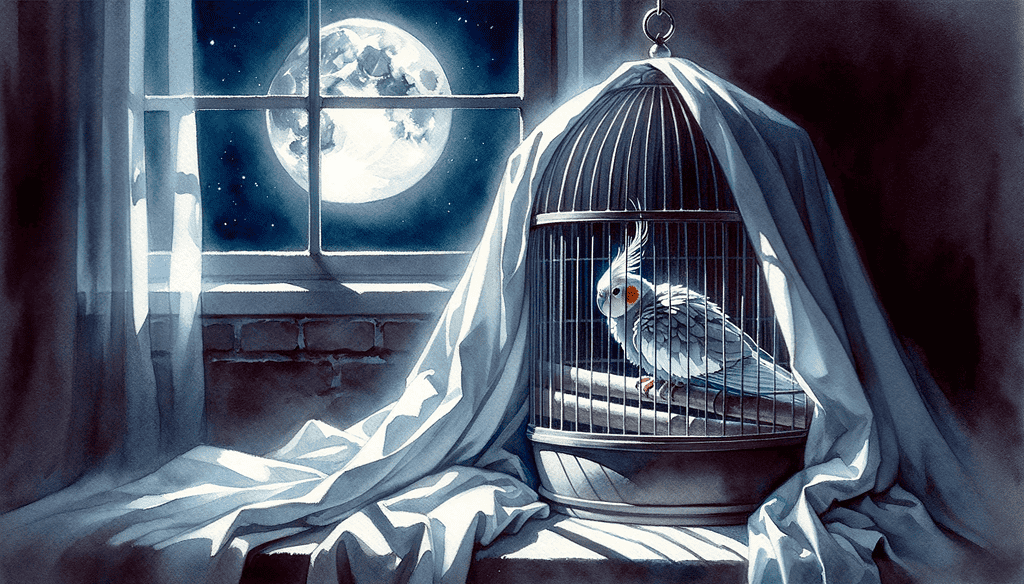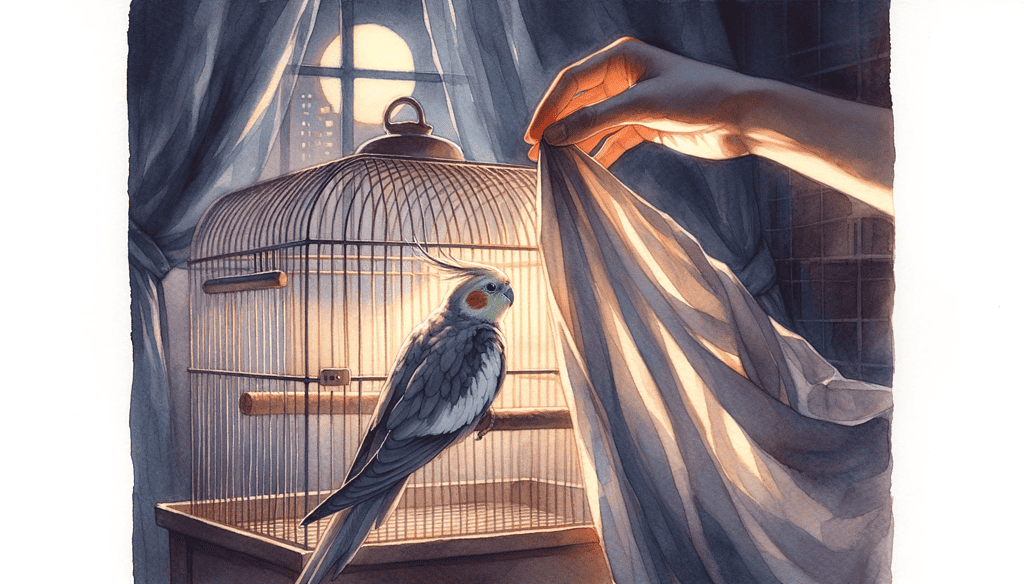
Cockatiels, with their chirpy melodies and endearing personalities, have become a beloved pet for many. But as night approaches, a common question lingers among bird enthusiasts: Should you cover your cockatiel’s cage at night?
As a whole, Covering a cockatiel’s cage at night can be beneficial for the bird’s health and well-being. In the wild, cockatiels are accustomed to the natural light cycle of day and night. Mimicking this cycle in a domestic environment is important for maintaining their circadian rhythm.
Dive deeper into this article to understand the nuances of nighttime care for cockatiels and make informed decisions for your feathery friend’s well-being.
Why Cockatiels Need Proper Sleep?
Cockatiels, like us, have their own set of needs and sensitivities. These intelligent and highly emotional creatures can get stressed quickly, making it essential for owners to ensure their comfort, especially during the night. A well-rested cockatiel is not only healthier but also more energized and lively.
It’s crucial to understand that in their natural habitat, cockatiels would typically roost for the night with their family group, perched high up in the branches of a tree. However, our pet cockatiels often sleep inside cages, a significant shift from their wild counterparts. This change in environment underscores the importance of ensuring they get the recommended 10-12 hours of uninterrupted sleep every night to maintain their health and well-being.
Sleep is not just about quantity but also quality. A peaceful, dark, and quiet environment can significantly enhance the quality of sleep for these sensitive birds. But the question remains: Does covering their cage at night help achieve this?
Benefits Of Covering Your Cockatiel’s Cage At Night
Before we delve into the advantages of covering your cockatiel’s cage, it’s essential to understand the primary concerns that lead to this practice.
1. Prevent Night Frights
Night frights are a phenomenon where cockatiels wake up suddenly and thrash around inside their cage, often beating their wings against the cage bars. This erratic behavior can result in injuries and, in severe cases, can even be fatal. Covering the cage can provide a sense of security against potential triggers of night frights such as sudden lighting changes, loud noises, shadows, and other disturbances.
2. Promote a Sense of Security
In the wild, cockatiels are cavity nesters, preferring to sleep in covered nests. By covering their cage, we mimic this natural environment, providing them with a sense of security. This simulated nesting environment can make them feel safer, especially during the dark hours of the night.
3. Establish a Sleeping Routine
Consistency is key for these creatures of habit. By covering their cage at the same time every night, you signal to your cockatiel that it’s bedtime, helping establish a consistent sleep schedule. This routine can be particularly beneficial for cockatiels adjusting to new time zones or those affected by seasonal changes.
4. Maintain Optimal Temperature
Cockatiels, despite their feathery coat, can feel cold. Covering their cage can help maintain a warm environment, especially during colder seasons. However, it’s essential to ensure that the cover is breathable and doesn’t restrict airflow.
5. Protection from External Disturbances
A covered cage can shield your cockatiel from external light and noise disturbances, ensuring a peaceful sleep environment. Moreover, it can also protect them from potential threats like insects or other pets, ensuring they sleep soundly without any interruptions.
Factors To Consider Before Covering
Deciding whether to cover your cockatiel’s cage at night is not a one-size-fits-all answer. It’s essential to consider various factors to ensure your feathered friend’s comfort and well-being.
1. Observing Your Cockatiel’s Preferences
- Every bird is unique. While some cockatiels might feel more secure with a cover, others might find it distressing. It’s crucial to monitor your bird’s reactions when left uncovered. If they seem agitated or show signs of stress, it might indicate a preference for a covered environment.
- However, if your cockatiel appears calm and sleeps soundly without a cover, it might not be necessary to introduce one.
2. Environmental Factors
- The environment plays a significant role in determining the need for a cover. If your home has frequent noise disturbances or sudden light changes, a cover can help shield your cockatiel from these disruptions.
- Room temperature is another vital factor. Cockatiels can be sensitive to cold. If your room gets chilly at night, a cover can help maintain a warm environment for your bird.
How To Properly Cover Your Cockatiel’s Cage?

Ensuring your cockatiel’s comfort goes beyond the decision to cover their cage. If you choose to use a cover, it’s essential to do it right.
1. Choosing the Right Material
The material of the cage cover plays a pivotal role in ensuring your bird’s safety and comfort. It’s recommended to opt for a dark-colored, breathable fabric. This not only blocks out light effectively but also ensures proper ventilation. Avoid materials that are too thick or non-porous, as they can restrict airflow and create an uncomfortable environment for your cockatiel.
2. Cleaning and Maintenance
Hygiene is paramount. Regularly washing the cage cover ensures it remains free from dust and potential allergens. When cleaning, use safe disinfectants that won’t harm your bird. Remember, anything you use on or around the cage can affect your cockatiel’s health.
3. Ensuring Proper Airflow
While the primary purpose of the cover is to create a dark and cozy environment, it’s essential not to compromise on airflow. Ensure the cage isn’t completely sealed off. There should be enough space for air to circulate, preventing the buildup of stale air. This not only ensures your cockatiel gets fresh air throughout the night but also promotes a deep, restful sleep.
Conclusion
Understanding our feathered friends’ nighttime needs is more than just a matter of routine; it’s a testament to the care and love we have for them. Every cockatiel is unique, and as their caregivers, it’s our responsibility to observe and cater to their individual preferences. Whether you choose to cover their cage or let them roost uncovered, the key is to ensure their comfort and well-being.
If you’ve found this article helpful, I’d love to hear your thoughts and experiences in the comments below. And if you believe this information can benefit other bird enthusiasts, please feel free to share the article with them.
Frequently Asked Questions
Can covering the cage cause my cockatiel stress?
Yes, if done improperly. While many cockatiels find comfort in a covered cage, some might feel trapped or suffocated. It’s essential to observe your bird’s behavior and ensure the cover is breathable.
Why do birds need darkness to sleep?
Darkness signals to birds, including cockatiels, that it’s time to rest. It helps regulate their internal clock and ensures they get quality sleep, which is vital for their health.
How many hours of sleep do cockatiels need?
Cockatiels typically require 10-12 hours of uninterrupted sleep each night. This helps them stay energized and maintain good health.
What materials are safe for covering bird cages?
It’s best to use dark-colored, breathable fabrics. These not only block out light effectively but also ensure proper ventilation, making sure your cockatiel doesn’t feel suffocated.
